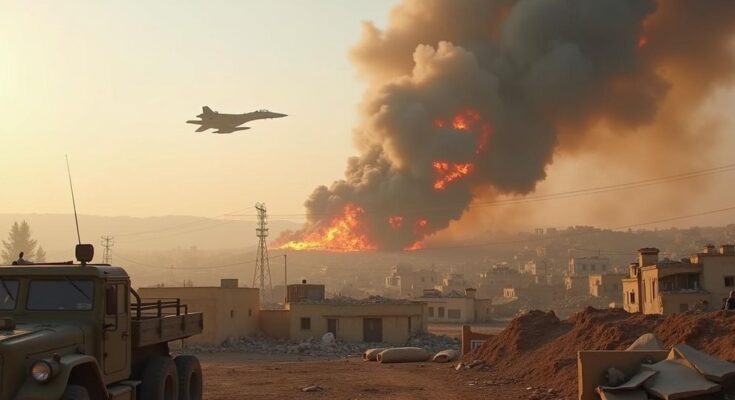Tensions between Iran and Israel are escalating, resulting in significant violence and casualties in Gaza and southern Lebanon. Recent Israeli airstrikes have killed at least 20 people, including children, while Hezbollah prepares for a prolonged conflict after significant losses. International reactions include calls to reassess trade agreements with Israel and reaffirmations of support for UN peacekeeping efforts.
Live updates continue to unfold regarding the rising tensions in the Middle East, particularly between Iran and Israel, as the ongoing conflict intensifies. A recent Israeli airstrike in Gaza resulted in the tragic loss of at least 20 lives, including children, at a school. Simultaneously, Hezbollah is reportedly strategizing for a prolonged war of attrition in southern Lebanon after suffering significant losses in its leadership, with new military operations poised to direct rocket assaults and ground engagements. The situation remains fluid, with developments being closely monitored as hostilities evolve between these regional adversaries. Recent highlights report that the Israel Defense Forces (IDF) have targeted approximately 200 Hezbollah locations, leading to numerous casualties. Air raid sirens have also been activated in central Israel due to incoming projectiles from Lebanon, indicating the escalation of cross-border attacks. Furthermore, Hezbollah has claimed responsibility for recent assaults on Israeli forces and military installations. French and European Union officials have weighed in, with France reaffirming the importance of maintaining the United Nations peacekeeping mandate in Lebanon amid Israeli Prime Minister Netanyahu’s call for a withdrawal of international forces in the region. Notably, the Spanish Prime Minister has urged EU members to reconsider trade agreements with Israel in light of the ongoing violence in Gaza and Lebanon. The ongoing combat actions are intertwined with broader geopolitical discussions and condemnations, reflecting the complex nature of the regional conflict.
The ongoing conflict in the Middle East, specifically between Israel and Hezbollah, has escalated significantly in recent days, marking a resurgence of hostilities that have intermittently existed for years. With Iran’s support of Hezbollah and Israel’s determination to counteract perceived threats, the violence has once again reached alarming levels. This conflict is characterized by periodic airstrikes, ground assaults, and retaliatory actions that underscore the deep-seated animosity and geopolitical complexities in the region. The involvement of international bodies, such as the United Nations, and the responses from various countries indicate the global implications of this regional strife. The recent airstrikes, loss of life, and the call for military operations significantly compound the existing tension and present a dire humanitarian crisis in areas like Gaza and southern Lebanon.
In summary, the ongoing hostilities in the Middle East, particularly between Israel and Hezbollah, have led to significant casualties and heightened tensions. Israeli airstrikes in Gaza and Lebanon have resulted in the death of many, including children, while Hezbollah is preparing for a sustained conflict. The international community is increasingly vocal regarding the humanitarian implications, calling for measures to address the situation and potentially reassess diplomatic and trade relationships with Israel. As developments continue to unfold, the situation remains precarious, necessitating careful observation and response.
Original Source: www.deccanherald.com




